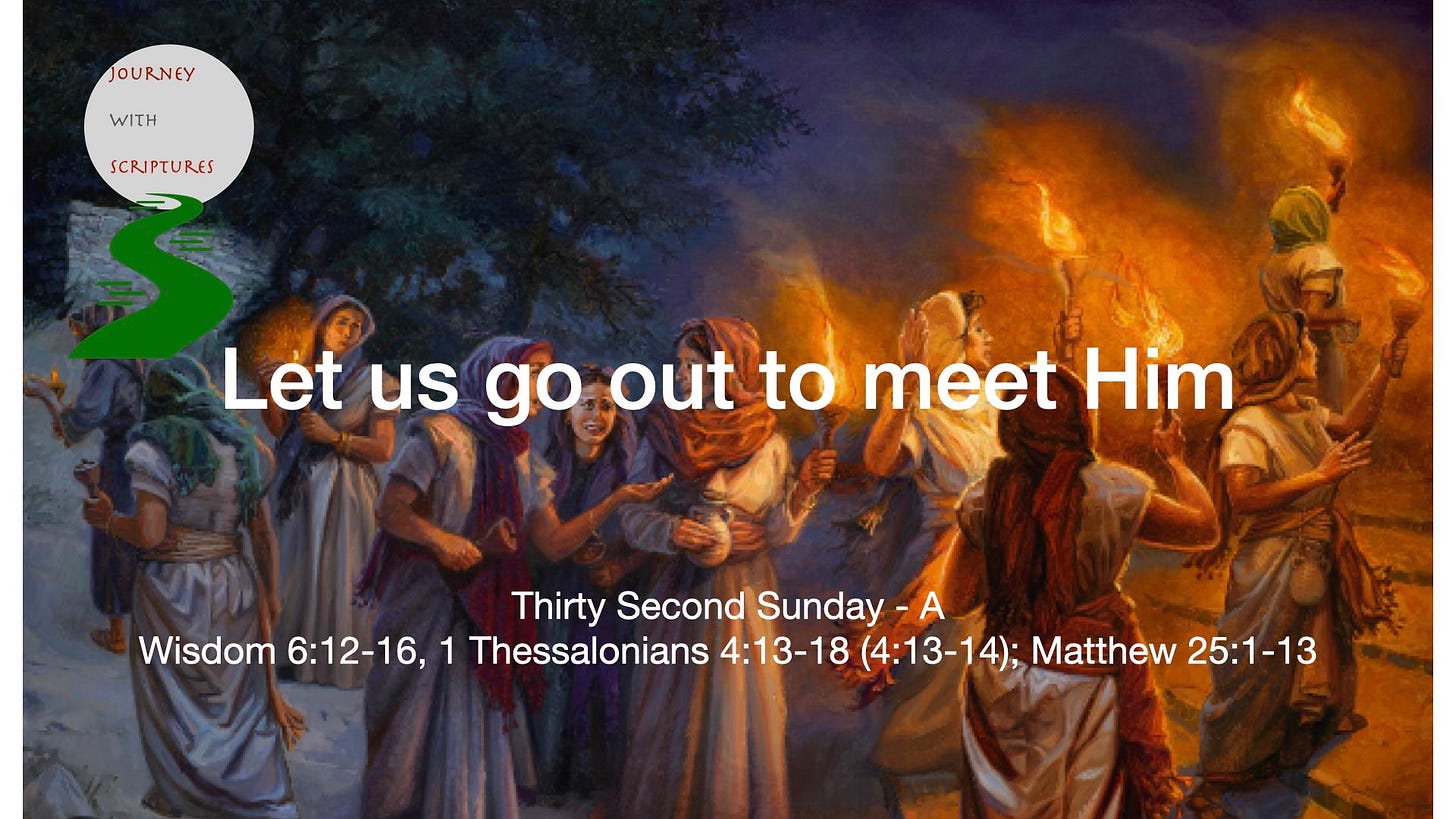Wisdom 6:12-16, 1 Thessalonians 4:13-18 (4:13-14); Matthew 25:1-13
As we approach the end of the liturgical year, the Church reminds us about one of the truths of our faith - the return of Christ in glory. "Christ has died, Christ is risen, Christ will come again", we proclaim during the Holy Eucharist. Saint Paul writes about His coming in today's excerpt from the letter to Thessalonians and the parable about the virgins in the Gospel of Matthew refers to his coming as well. Meditating on this truth is "the perfection of prudence" (Wis. 6:15).
Scripture begins with a 'wedding' of Adam and Eve (Gen. 2:21-23) and ends with the announcement of the marriage of the Lamb and the Church (Rev. 19:7; 21: 2,9). The Song of Songs, a collection of poems sung during wedding celebrations, is interpreted by both Jewish and Christian traditions as an allegory of the love between God and Israel, Christ and the Church, and in mystical circles between Christ and the individual Christian. A wedding feast becomes a symbol of salvation.
The virgins go out to meet the bridegroom (Matt. 25:1). According to the marriage customs in Palestine, the year after the engagement, the groom in the evening went to the bride's home to bring her into his house. However, due to the preparations for the wedding, his arrival could be delayed. Could the preparations for the heavenly wedding delay Christ's coming in glory? On the other hand, we know that the coming of Christ will take place only when the "fullness of the Gentiles" enters the Church and "all Israel" recognizes Jesus as the Messiah and Savior (Rom. 11:25-26; CCC, 674).
The bridegroom was delayed and so the virgins fell asleep (Matt. 25:5). The death of some of the faithful in Thessalonica before the coming of Christ proclaimed by Saint Paul caused a crisis in the community (1 Thess. 1:10; 4:13). Today, almost two thousand years since the announcement of Christ's return by the angels (Acts 1:11), some question it (see 2 Pet. 3:2-10) and most of us do not think about it at all. The Bride, however, never stops calling her Bridegroom: "Come!" (Rev. 22:17). She does not tire of getting up early and staying up late to begin and end each day with prayer (see Wis. 6:14-15).
"But at midnight there was a cry, ‘Here is the bridegroom! Come out to meet him" (Matt. 25:6). According to St. Paul, the coming of Christ will be announced by "the voice of an archangel and the sound of the trumpet of God" (1 Thess. 4:16). Only the wise virgins came out to meet Him representing Christians of all ages who put faith into action (1 Thess. 4:16-17; Gal. 5:6). The remaining virgins, who missed the chance to meet the Lord because of their last shopping, found the door to the wedding feast already closed (Matt. 22:10). Who do they symbolize? In Greek, the word "oil" and "mercy" share the same root. The Good Samaritan used oil to dress up the wounds of an injured man (Luke 10:34). So, according to the Fathers of the Church, the lack of oil symbolizes the lack of works of mercy.
The book of Proverbs contains a story about two banquets, one in the house of Wisdom and the other in the house of Folly (Prov. 9:1-18). The first one leads to immortality and access to God (Wis. 6:18-19), but the second to death, because the guests of Folly "are in the depths of the land of the dead" (Prov. 9:18). Therefore, we should desire to be at the banquet of Wisdom. To get there, however, we need to cooperate with God's grace. The time has come to follow the path of prudence (Prov. 9:6), to fall in love with Christ, and constantly seek Him (Ps. 63:2).
The bridegroom is coming! Let us go out to meet him shining in the darkness of this world with the splendor of life that proclaims the transforming power of the Gospel of God's grace.




